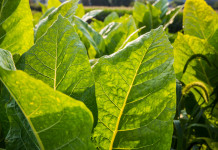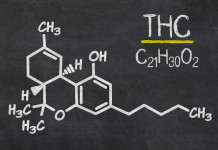Does the addictive quality of nicotine have any effect on the plant’s chance of survival?
Nicotine acts as a stimulant, and that is one of the primary reasons for the addiction that smoking causes. But only small concentrations of tobacco stimulate the brain; in larger concentrations, nicotine is fatal.
The tobacco plant is actually quite dependent on nicotine, which it produces in order to protect itself against herbivorous insects. The substance, which is produced in the plant’s roots, becomes concentrated in the leaves, making up about 5 percent of the plant’s dry weight.
Nicotine is an alkaloid, a nitrogenous organic substance that functions as a neurotoxin in humans and other animals, including insects. (Caffeine, morphine and strychnine are other well-known alkaloids.) Nicotine’s neurotoxic effect on insects makes it an effective pesticide; in fact, imidacloprid, a synthetic derivative of nicotine, is an insecticide used extensively throughout the world. (Nicotine alkaloids are not only found in tobacco plants, but also in smaller quantities in other plant species of the night-shade family to which it belongs, such as tomatoes, potatoes and eggplants, as well as in the leaves of the coca plant.)
However, the tobacco plant has another effective survival strategy: Its flowers come into bloom and are strongly fragrant during the night, attracting nocturnal pollinators, such as, moths.
































